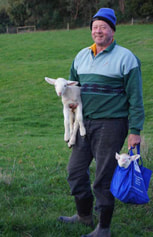
UP IN the Bass Coast hills the temperature drops rapidly once the sun dips below the ridgelines. Lew Potter’s beanie keeps him warm but there’s not much daylight left and those new-borns need to be in the shed with their mum. Lew picks up a swag of squirming lamb and heads off across the paddock. “C’mon mum, here they are ...”
There are a few chairs on the veranda and some old photos on the table. Heading for Kilcunda a dozen years ago Lew and Marg Potter ended up on the Loch-Kernot Road. Lew spotted a for sale sign. A little way up the hill they found the “renovator’s delight” surrounded by green desert – 50 tired acres of turn-out paddock with a handful of trees.
Marg’s horror was only exceeded by Lew’s interest. They both had full-time jobs in Melbourne so there was no reason to spend money on a neglected property. Lew dipped into his own reserves and within a week he owned the place. The couple’s first few visits unveiled the charm of the place. Ad hoc weekend camping began the love affair. They were soon looking for excuses to leave Melbourne early to spend longer weekends on the old farm.
Marg planted a small orchard and a vegie garden. House renovations were inevitable and evolved into a large extension. Poddie calves from neighbouring farms were bucket reared by Lew. When he’s not chasing sheep or cutting firewood, he can stand on the back veranda and look at photos of two bare paddocks, a handful of trees between eroding gullies, and compare them to today’s farm.
Lew points at a big white tree highlighted by the sunset that’s so old the first European settlers could have had billy tea under it. Wildlife lives in its nooks. One of the few left by the previous mob, he can feel it looking over his shoulder as he tends the land and the animals. There are also two oak trees that were planted around the time the house was shifted with bullocks to the roadside, back in the 1890s.
Soon after Lew and Marg took on the place Landcare came knocking and the tree planting began. Those polaroids mark the difference hard work and careful planning have made. The cattle graze on lush grass between generous shelter belts that moderate the extremes of south Gippsland weather. All the creeks are fenced and replanted in stages to stop erosion. Wildlife has returned.
The conversation turns to numbers. Fifty acres. Nine sheep, three dogs, some ducks and 25 cows with calves a foot. That stocking rate might be called “intensive” in dairy country but under Lew’s not quite organic stewardship this country isn’t stressed.
He reckons he’s no more a greenie than anyone else and runs his farm his way. A spray bottle of home-made herbicide stays on the quaddie so he can take care of weeds in his travels. Unless there’s a drought he only uses hay that was grown on this farm. A little bit of super phosphate keeps the grass up to those healthy beef cattle. There’s always a fence to mend but there’s time to sit back and think about that.
Sitting up on the veranda watching shadows lengthen, Lew mentions his wife, Marg, who played a huge part in the farm’s refreshing. When he grabs an apple or watches those lambs play he’s reminded of her absence. She passed away six years ago.
The sound of a car door opening catches Lew’s attention and Landcare;’s Dave Bateman has some new equipment, courtesy of a grant from the federal government. The big ticket item is a pole saw.
“Hawthorn bush!” Lew says they can now tackle infestations of a plant that has all the beauty of a dead apple tree with two-inch spikes that stop you getting close enough to chop it down.
He reckons there’s more to Landcare than trees and dirt. Nothing happens without people. Lifelong friendships have started in those paddocks. Landcare volunteers have planted 15,000 plants on this property. Over the next year Landcare will plant 205,000 more across Bass Coast in 22 plantings. The biggest will be at Karl Russo’s place in the bald Bass Hills.
Walking down the driveway, Dave sums up 16 years of effort in a few words. “Lew has reveged 50 acres of grassy desert into a beautiful, easy to run and highly productive beef operation.” Finishing his cuppa Lew points out that a farm subdivision this small isn’t possible under the current planning scheme.
The light’s fading and those lambs would be easy pickings for a fox. Lew compares some footie fans to sheep as he grabs that blue bag and sets off across the paddock.